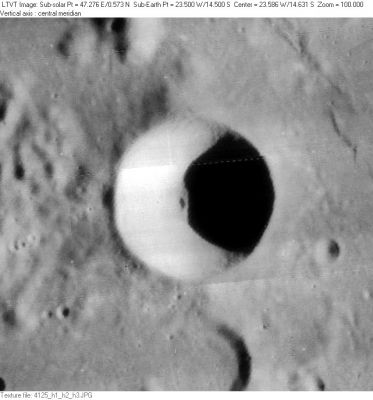Darney
Contents
Darney
|
Lat: 14.5°S, Long: 23.5°W, Diam: 15 km, Depth: 2.62 km, Rükl: 53 |
LO-IV-125H None of the other features in this view are officially named.
Images
LPOD Photo Gallery Lunar Orbiter Images Apollo Images
- Quite an amount of reflected light is visible on the shadowed eastern inner slopes of high-albedo crater Darney, as photographed by the mapping/metric Fairchild camera of Apollo 16. The best frame on which the effect of reflected light in Darney is noticeable, is AS16-M-2497 (zoomify-scan of the Arizona State University's Apollo Image Archive). In this frame, Darney's location is near the lower part of the right margin. Note also the reflected light on the shadowed slopes of Bullialdus's central peak system!
- Research: Danny Caes (- DannyCaes Aug 21, 2015)
Maps
(LAC zone 76D3) LAC map Geologic map LM map
Description
Description: Wikipedia
Additional Information
- Depth data from Kurt Fisher database
- Arthur, 1974: 2.62 km
- Westfall, 2000: 2.62 km
- Viscardy, 1985: 2.62 km
- Cherrington, 1969: 2.13 km
- From the shadows in LO-IV-125H, Darney is 2620-2700 m deep. - Jim Mosher
- Darney and its satellite craters C, D, E and J are included on ALPO list of bright ray craters
- Included on the ALPO list of banded craters
- Darney C is a thermal anomaly crater, implying a youthful age - Moore et al, 1980
Clair-Obscur phenomenon
- When the sunrise-shadow of the small hill north of Darney is running all the way toward the bowl-shaped crater Darney C (Lamech's Pierot), then there's a curious small triangle of three illuminated dots between Epimenides and Lacus Timoris. This Clair-Obscur effect was discovered by Danny Caes while observing the moon through the restored Cooke-Steinheil refractor of Van Monckhoven, at the Public Observatory of Ghent - Belgium - DannyCaes Apr 5, 2010
Reddish colored Darney Iota and Darney Chi
- The group of flat hills between Darney E and Euclides M (southeast of Montes Riphaeus, in the southwestern part of Mare Cognitum, also known as Darney Iota and Darney Chi) are slightly reddish colored. See the LROC's WAC albedo/color map of this region (close up of the Darney Iota and Chi group): http://bit.ly/1CPSZUy
The remains of several unnamed craters near Darney
- That's how it looks on SLC map E5 (System of Lunar Craters, 1966).
Nomenclature
- Maurice Darney; French astronomer (1882-1958).
- Named by Lamech (Whitaker, p 228).
- Darney C, a secondary crater west of Darney itself, was once known as Pierot (probably Arthur Pierot (1867-1938; Belgian astronomer and selenographer), see also F.C.Lamech's article Aires Elliptiques). Pierot was one of Lamech's new names, but the I.A.U. did not accept that name.
- Research Lamech's Pierot: Ewen A. Whitaker and Danny Caes (August 2003, mail correspondence).
- According to Chart 81 in the Times Atlas of the Moon, there's a hill north-northeast of Lubiniezky called Xi. Is it Lubiniezky Xi or Darney Xi? The System of Lunar Craters (SLC, 1966) doesn't have the answer, although most of the Greek lettered hills and hillocks are included on its charts. Both charts E5 and E6 show a hill called Xi north-northeast of Lubiniezky, but... they show no accompanying arrow pointing at Lubiniezky or Darney...
LPOD Articles
Bibliography
Lamech's "Pierot": Mapping and Naming the Moon; a history of lunar cartography and nomenclature (Ewen A. Whitaker).
